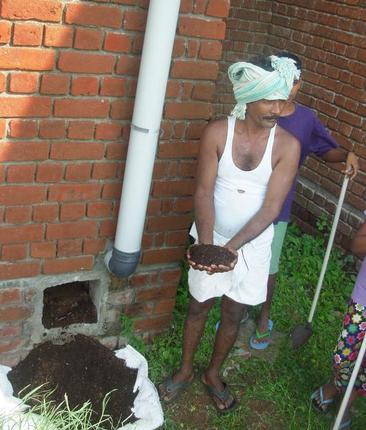The nutrient cycle – closing the loop
A majority of even the conscious consumers, growing and eating food from sustainable farms are missing a crucial need for a food system to be sustainable – closing the loop of the nutrient cycle.
Lets consider that one grows food crops and livestock using all the sustainable practices, without using chemical inputs and all the while increasing natural resource replenishment. But at the end of the day, a good proportion of the output from the farm is consumed by humans, either living in/near the farm and many a time in a city or town somewhere. What happens to all the nutrients that moved out of the farm in the form of grains, fruits, vegetables, meat, etc?
In nature we see that nothing is a waste – one species’ refuse is another’s food. We digest and assimilate a small proportion of what we eat. Once it has served its purpose, a good proportion of what we consume is sent out of the body – mostly as stool, urine and sweat. What happens to all this “other species’ food”? We flush it down the drain, through a sewage system where it is concentrated all the while becoming a pollutant and then set up sewage treatment plants (that do not work most of the time) and end up polluting our rivers, lakes and seas.
What is the solution? Its a very simple age old practice. It saves precious water. It creates pure and clean compost. And returns the nutrients as food to plants and micro organisms in the soil. It is what is simply referred to as Dry composting toilets.
The Palar Center for Learning (aka Pathashaala) of the Krishnamurti Foundation of India about 75 kms south of Chennai has deployed this simple technology. They started as a black water free campus back in 2010. Over the years they have championed this cause so much that students, staff and visitors see this initiative as an essential part of the campus identity.
When I was introduced to Pathashaala as a resource person to help develop their local outreach efforts and ground some of their in-campus agricultural activities I jumped at the offer. I looked forward to a process of bidirectional learning. In the few months that I have been associated with the amazing folks there, I have completely fallen in love with their ethos and dedication to sustainable living and food systems. Needless to say, the clincher being the dry composting toilets !

Compost harvested from a dry composting toilet at Pathashaala on Oct. 2nd 2016.
To get a better idea of the initiative do read this article sharing the experience of their recent compost harvest on the occasion of Gandhi Jayanti and this video from the previous year’s harvest. And to get a better idea of the technology itself, please see this small handout prepared by the one and only Gautama anna.
Agriculture does not end at the farm gate – eating is an agricultural activity; Food systems do not end at the dinner table. Returning nutrients to the soil is an integral part of a sustainable food system. And dry composting toilets is the simplest and most effective way to achieve this.
More on the concept, theory and some developments in design that have come about following my association with Pathashaala in the coming days & weeks.

Reblogged this on manufactureinindiablog.
LikeLike
manufactureinindia
Tuesday, November 1st, 2016 at 11:41